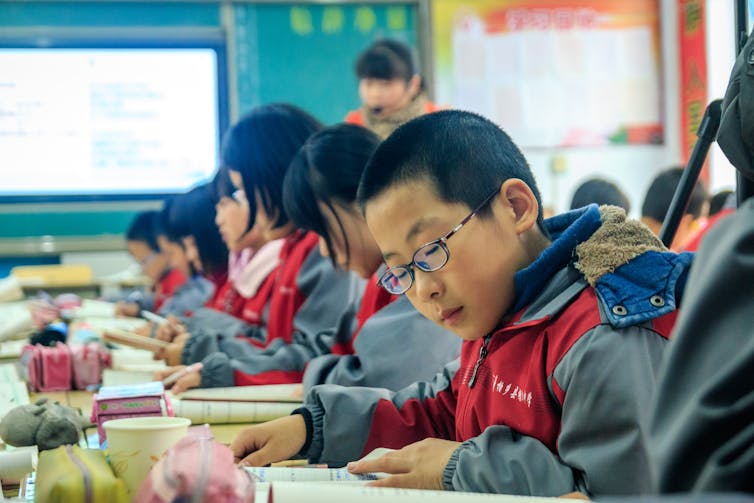Our study in China found struggling students can bring down the rest of the class
- Written by Rong Zhu, Senior Lecturer in Economics, Flinders University
Low-achieving 12-13 year old students can significantly bring down the academic achievement of the rest of their class. But this negative effect largely vanishes in the next two years.
These are the findings of our recent study published in Journal of Population Economics, in which we examined the influence of low-achieving students on their peers in classrooms in China.
How we conducted our study
Social interactions at school are believed to be crucial for student learning. Peer influence among students is an important factor to consider for educators, governments and parents.
We used data from the China Education Panel Survey conducted during the 2013-14 academic year. The survey is a large-scale, nationally representative survey of students in China’s middle schools. Middle school in China comes after primary school, from grade 7 to grade 9 (the last year before high school).
The survey aims to explain the links between students’ educational outcomes and multiple contexts of family, school processes, communities and the social structure of the school or classroom.
In each school covered in the survey, two classes were randomly chosen from grade 7 (when students are around 12-13 years old) and the grade 9 (when students are around 14-15). Then all students in the selected classes were surveyed to answer questions related to their learning, as well as some background information.
Read more: Don't blame the teacher: student results are (mostly) out of their hands
We considered students who repeated a grade in primary school as low achievers. These students had a proven track record of academic failure. In our data, about 13% of students repeated a grade in primary school.
We based students’ academic performance on each middle school’s administrative records of mid-term test scores in three compulsory subjects (Chinese, maths and English).
When compared with non-repeaters, repeaters had lower performance in Chinese, maths and English.
To identify a relationship between low-achieving students and the academic outcomes of their classmates, we focused on middle schools that randomly assigned students to classrooms in grade 7 and did not rearrange classes in grades 8 and 9.
With random student assignment, we ruled out the possibility that peers in the classroom were the choice of students, their parents or schools.
We compared the academic performance of regular students (non repeaters) from two classes in the same grade of the same school. These students shared similar characteristics and the same school environment, except for one thing. One class had a relatively higher proportion of repeaters than the other, due to the randomness of classroom assignment.
What we found
We found the share of grade repeaters in the classroom reduced the academic performance of regular students in grade 7. This peer influence was largest when it came to Chinese and smallest with maths.
 Middle-school in China runs from grade 7 to grade 9.
Shutterstock
Middle-school in China runs from grade 7 to grade 9.
Shutterstock
The negative effects were larger in big classrooms than in small ones. The lower performing but non-repeating (regular) students in grade 7 were most affected by repeaters. But there was no effect on high-performing students.
Repeaters did not affect their peers’ learning efforts nor the teachers’ pedagogical practices. Instead, they appeared to reduce the results of their peers in grade 7 in two ways.
First, in classes with repeaters, regular students were less likely to make friends with their high-ability and/or diligent classmates. Second, the classroom environments were worse with repeaters present. For example, regular students were less likely to report they regularly participated in class/school activities and that their classmates were friendly if more repeaters were in the class.
The story for students in grade 9 was different. We found no evidence the achievement of regular grade 9 students was impaired by their low-achieving classmates.
As classroom composition stayed unchanged from grade 7 to grade 9, our theory is that short-term negative peer effects found in grade 7 can fade out in the longer run.
By grade 9, academic pressure was piling on ahead of high school entrance exams.
We attributed the changes in the peer effects of low achievers from grade 7 to grade 9 to the adjustments students made to their friendship groups, and the change in the class learning environment under an enhanced level of academic stress.
Repeaters no longer seemed to affect their classmates’ propensity to form friendships with top academic performers and hardworking classmates in grade 9. Relative to repeaters in grade 7, repeaters in grade 9 reported improved class learning environment.
Implications for Australia
Low-achieving classmates in Australia may have a similar effect on their peers. But unlike in our study for China, the effect may not vanish in the year before high school. Australian students, culturally, generally do not face the same level of stress as in China — where academic success is a priority.
Read more: Why some migrant school students do better than their local peers (they're not 'just smarter')
The most important implication for Australian educators is to provide more support to struggling students, which will likely lift the performance of their peers. Economists call this the “social multiplier” effect.
The benefits for low-achieving students will subsequently affect the performance of their peers, which in turn will affect the achievement of the former, and so on. Academic support such as a special tutoring program targeted towards struggling students can generate considerable educational benefits.
Authors: Rong Zhu, Senior Lecturer in Economics, Flinders University




